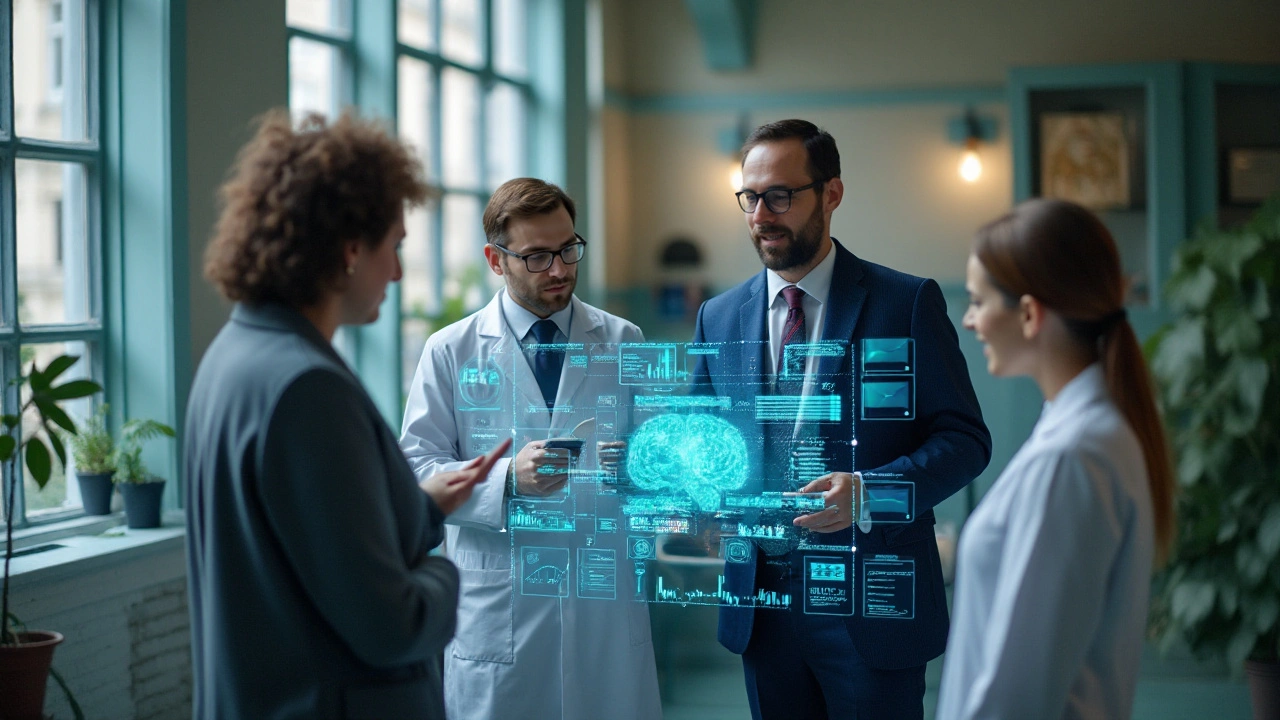Unlocking Mental Wellness: AI's Role in Revolutionizing Health Care

The world of mental health care is witnessing a transformative wave with the onset of artificial intelligence. This change is not just about the allure of technology or the novelty it brings; rather, it's about redefining patient care, making it more accessible and personal. Imagine a world where your mental wellness is supported not just by occasional visits to a therapist but through continuous, real-time, and personalized assistance.
AI is stepping in to fill gaps, offering profound insights and objective analysis that was previously unattainable. It's about smarter solutions, ones that cater to individual needs while reaching more people than ever before. While it's still early days, the direction is clear. AI is set to enhance our understanding of the mind, identifying patterns and offering interventions that cut through the noise.
As the technology deepens, so does our responsibility to ensure its ethical deployment. While the promise is substantial, the challenge lies in seamlessly integrating AI innovations while safeguarding privacy and human connection. Welcome to the future of mental health care—where empathy and efficiency go hand in hand.
- The Emergence of AI in Mental Health
- How AI Enhances Diagnosis and Treatment
- AI-Powered Tools and Applications
- Ethical Considerations and Challenges
- The Future of Mental Health Care with AI
The Emergence of AI in Mental Health
The dawn of artificial intelligence in mental health care represents a monumental shift, one that is reshaping the landscape of how we perceive and address mental wellness. It's a fascinating journey, tracing its roots back to the digital revolution which began proliferating in the early 21st century. Initially, AI was seen largely through the lens of automation—a way to enhance quick processing and data management. However, as the technology matured, its potential in healthcare began to sparkle brighter, especially within the intimate realm of mental health.
The increasing prevalence of mental health issues globally has demanded innovative solutions. World Health Organization statistics have highlighted a concerning rise in mental disorders, underscoring the need for accessible, scalable care. This is where AI steps in. Not only does it offer tools that are timely and potentially universal, but it also heralds a new age of understanding and accessibility. AI is widely used for its ability to analyze vast amounts of data quickly—learning from patterns that might elude human eyes but are crucial in early diagnosis and intervention.
A notable quote by Dr. Tom Insel, former director of the National Institute of Mental Health, encapsulates this shift: "The power of AI in mental health lies not just in doing things differently, but in redefining what's possible, making mental healthcare proactive rather than reactive."
AI platforms are capable of simulating human interaction through natural language processing. Chatbots and virtual therapists, equipped with Machine Learning algorithms, converse with users, helping to ease anxiety, depression, and other mental distresses. These interactions are not just about replacing human contact but complementing it by providing support when human professionals are not available, or resources are scarce. It's a bridge to fill the gaps in traditional therapy.
This emergence is supported by substantial investments in digital health platforms. In the past few years, there has been an exponential increase in AI startup funding, particularly those focused on health tech. The intention is clear—harnessing technology’s potential to make mental healthcare not just more efficient but tailored to individual needs. Imagine a future where a neural network understands your specific triggers and mitigates your anxiety before it builds up to a crisis. This is not mere speculation, but a reality that is fast taking shape.
In the context of industries adopting AI, mental healthcare might be one of the more complex ones, given the profound sensitivity and personal nature of psychological care. The road is paved with challenges—ethical, technical, and social. However, its promise is immense. Mental health care enhanced by AI could significantly improve outcomes, offering interventions that are timely and profoundly personalized. As AI continues to evolve, it's crucial for stakeholders to remain vigilant, ensuring these technologies are applied ethically and equitably.
How AI Enhances Diagnosis and Treatment
The integration of artificial intelligence into the realm of mental health care is transforming how professionals diagnose and treat mental health disorders, offering precision and efficiency not previously possible. AI tools analyze vast amounts of data much quicker and more accurately than any human could, unveiling patterns and insights that might go unnoticed by traditional methods. Clinicians are now able to leverage these insights for improved diagnostic processes. For instance, machine learning algorithms can sift through patient data, identifying subtle symptoms that align with emerging trends in mental illnesses. This detailed analysis can help in the early detection of conditions like depression, anxiety disorders, and even more complex psychiatric conditions.
One of the groundbreaking contributions of AI is its ability to manage enormous datasets. It can process information from electronic health records, genomic data, and even language patterns in communication logs, providing a richer context to the clinician's toolkit. This crucial aspect of AI in mental health has led to developments in personalized treatment plans. By examining an individual's comprehensive data, AI systems offer tailored recommendations aimed at enhancing therapeutic outcomes. Patients aren’t merely statistics anymore; they emerge as unique profiles with particular needs and responses to treatment.
Moreover, practical AI applications like chatbots are providing round-the-clock assistance to individuals, reducing the burden on healthcare providers and extending reach to patients who otherwise might not seek help. Equipped with natural language processing capabilities, these chatbots engage in conversations that analyze user's words for potential signs of mental distress.
"AI can augment the capabilities of mental health professionals, helping identify risks and suggesting interventions,"states a report from the National Institute on Mental Health.
While the promise of AI in mental health diagnosis and treatment is vast, it is not devoid of challenges or ethical considerations. The implementation requires a fine balance between technological automation and human empathy. As AI systems learn and evolve, it becomes imperative for developers and healthcare professionals to ensure that these technologies respect patient privacy, maintain data security, and preserve the human touch vital to psychiatric care.
The blend of human insight and advanced technology represents a major shift towards a more enlightened mental health care approach. As AI continues to mature, clinicians can expect tools that aid in more accurate diagnosis, customized treatments, and potentially better outcomes worldwide. With ongoing research and collaborative efforts, the goal remains to create AI interfaces that understand and support the complexity of human emotions while remaining trustworthy and ethically grounded.

AI-Powered Tools and Applications
In the ever-evolving landscape of mental health, artificial intelligence stands at the forefront, introducing tools that are bringing about compelling changes in diagnosis and therapy. From chatbots that engage individuals in therapeutic conversations to sophisticated platforms that predict the onset of mental disorders, AI is becoming an indispensable partner for healthcare professionals. These technologies are more than mere digital novelties; they are revolutionizing how we approach mental health care, making it more inclusive and tailored to individual needs.
One notable application comes in the form of AI-driven chatbots like Woebot, a mental health chatbot designed to converse with users about their feelings and offer cognitive behavioral therapy techniques. Leveraging machine learning, Woebot provides users with strategies to manage their feelings better, showcasing AI's potential in offering immediate support. Studies have shown that such tools not only engage users effectively but also help them manage symptoms of anxiety and depression. The instantaneous nature of these interactions is a game-changer, particularly for those who may not have immediate access to traditional therapy.
"AI has the potential to democratize mental health care," says Dr. John Torous, Director of Digital Psychiatry at Beth Israel Deaconess Medical Center. "It can reach communities and individuals who have been marginalized by current systems."
Apart from chatbots, AI is also making waves through predictive analytics in mental health. By analyzing patterns in electronic health records, AI can identify patients at risk for conditions like depression or schizophrenia even before symptoms fully manifest. This proactive approach can significantly reduce the severity and duration of mental illnesses. For instance, IBM's Watson leverages vast data sets to provide insights that are pivotal in creating effective treatment plans for patients.
Wearable technology is yet another frontier where AI is proving invaluable. Devices equipped with sensors can monitor physiological signs like heart rate and sleep patterns, providing actionable data to both users and their healthcare providers. Platforms like Mindstrong are harnessing smartphone metadata to predict relapse in patients with serious mental illnesses, showcasing AI's ability to keep tabs on real, everyday indicators of mental health.
As the adoption of AI in mental health care continues to grow, significant attention is given to ethical considerations. Ensuring data privacy and preventing algorithmic bias are central to these discussions. However, the promise these AI-powered applications hold cannot be overstated. The road ahead envisions a landscape where technology not only assists but enhances human professionals, ensuring a comprehensive, empathetic approach to mental health care that blends innovation with compassion.
Ethical Considerations and Challenges
As artificial intelligence begins to play a significant role in the realm of mental health care, it presents a series of ethical dilemmas and challenges. These are not trivial issues; they cut to the core of how technology interacts with the human psyche, privacy concerns, and the inherently personal nature of mental health treatment. One major concern is data privacy and security. AI systems require vast amounts of patient data to function effectively, raising questions about how this sensitive information is stored, shared, and eventually used. Mental health records are highly personal, and any breach could have severe consequences for individuals. The protection of such data is critical to maintaining trust between patients and healthcare providers.
Moreover, there’s the challenge of ensuring that these AI-driven solutions are free from biases. Algorithms are trained on datasets, and if these sets are skewed or lack diversity, the AI may develop biases that affect its decision-making. This can lead to disparities in treatment recommendations or diagnoses, particularly impacting minority groups differently. Bias in AI is not just an engineering problem but a collection of ethical issues that brings to light the need for transparency in AI algorithms. The weight of enhancing AI involves regularly auditing these systems for bias and retraining them on fair, representative datasets.
Another ethical consideration is the 'human touch' inherent in therapy sessions. Traditional therapeutic interactions are based on building trust and human connection, something AI can only approximate at best. While AI chatbots can offer support, they lack the nuanced understanding that a human therapist provides, potentially leading to miscommunications or even erroneous advice. Critics often emphasize the need to use AI as a resource to support human therapists, not replace them entirely. This approach ensures that humans remain in control of critical decision-making, while AI handles administrative and analytical tasks.
The deployment of AI in mental health also raises questions about accountability. Who is responsible if an AI system makes a mistake in diagnosing a patient or recommending treatment? The opacity of AI systems, often termed 'black boxes', can make it difficult to understand how decisions are reached, complicating matters of accountability if things go awry. Clear guidelines and legal frameworks must be established to delineate accountability lines, ensuring all stakeholders understand their responsibilities.
"With the rapid growth of AI technologies, it is crucial to engage in open discussions about the ethical implications, potential risks, and benefits, particularly in sensitive fields like mental health," emphasizes Dr. Stephanie Stasior, a leading expert in AI ethics.
While the potential benefits of incorporating AI into mental healthcare are substantial, guiding its introduction responsibly is vital. The commitment to ethical standards ensures that the direction taken will enhance mental health treatments without compromising the dignity and rights of those it's meant to help. Collaborations between technologists, ethicists, and caregivers are needed to navigate these challenges successfully, with patient welfare remaining the primary focus.

The Future of Mental Health Care with AI
The future landscape of mental health care is poised for a groundbreaking evolution, primarily influenced by the integration of artificial intelligence. The promise that AI holds in transforming this domain is immense, changing how care is delivered and evaluated. Historically, mental health treatment has been reliant on limited resources and subjective measures. AI, with its objective analysis and data-driven approaches, offers a paradigm shift that can enhance diagnostic accuracy and personalize treatment plans for countless individuals.
One of the most compelling advancements is in the realm of AI-powered diagnostics. Machine learning algorithms can sift through complex datasets to identify patterns and anomalies that might be invisible to human perception. These technologies are already showing promise in early detection of mental health disorders, such as depression and anxiety. By analyzing social media interactions, speech patterns, and even text messages, AI can offer a window into an individual's mental state long before they might seek help. This proactivity can save lives, as early intervention often leads to better outcomes.
An essential benefit of AI in mental health care is its ability to make assistance more widely accessible. Imagine chatbots offering therapeutic conversations to those in remote areas where professionals are scarce. These AI-driven tools can provide immediate support, offering exercises and strategies traditionally introduced in therapy sessions. This democratization of care ensures that geography and resource limitations no longer hinder access to essential mental health support.
However, as we progress, ethical considerations remain at the forefront. The balance between leveraging personal data for treatment and ensuring privacy cannot be overstated. Transparency in AI decision-making processes is vital, as is the need to constantly update ethical guidelines. According to a 2022 report by the World Health Organization, "The integration of AI in health care brings the dual challenge of protecting human rights while enhancing patient care." The conversation about ethics is just as crucial as technological advancements themselves, ensuring the human element remains central.
The horizon appears promising, not just for patients but for mental health professionals too. AI can alleviate administrative burdens, allowing therapists more time to focus on patient care. It can offer insights into treatment efficacy and highlight areas for improvement, fostering a more dynamic approach to therapy. Imagine a future where your therapist can tailor treatment based on a comprehensive AI analysis of your habits, emotions, and genetic predisposition, offering a level of customization previously unattainable.
As AI technology continues to evolve, so does the potential for collaboration between man and machine in the realm of mental health care. It is a symbiotic relationship where technology does not replace the therapist’s role but rather enhances it, making treatment more robust and responsive. The path ahead is not without obstacles, but the potential benefits far outweigh the challenges, promising a future where mental wellness is accessible, precise, and deeply personalized.